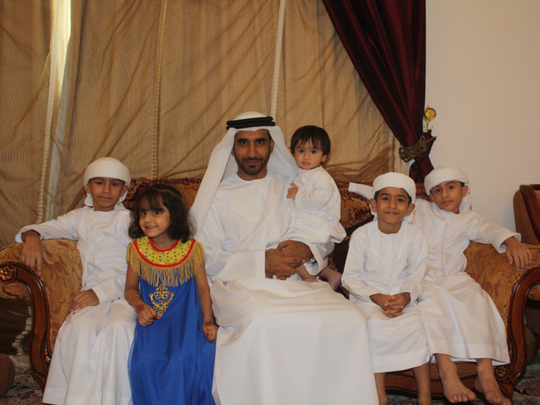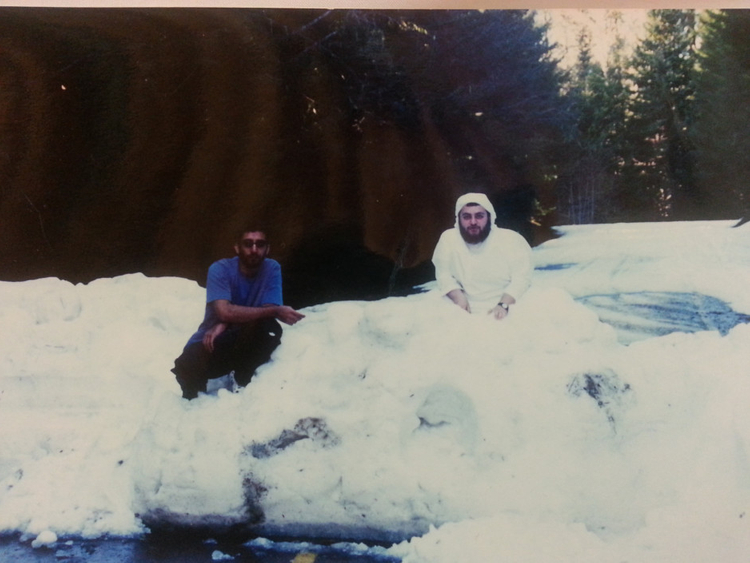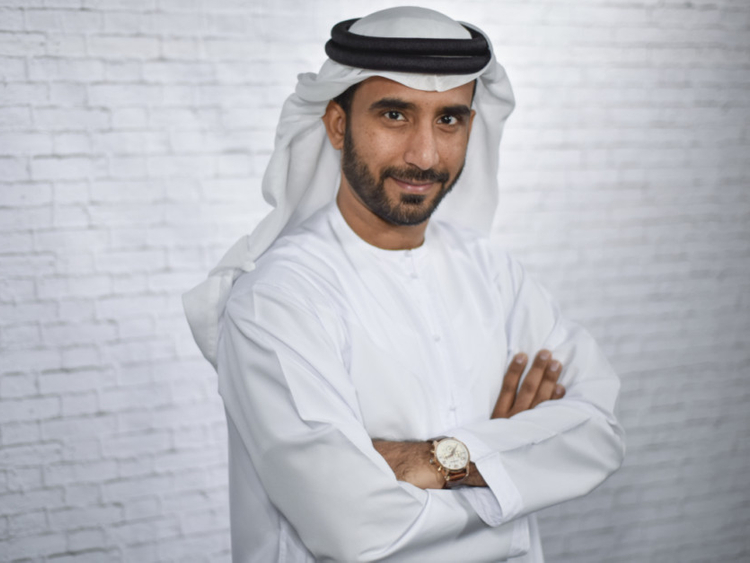
Dubai: Born seven years after the UAE’s union, Emirati journalist Ahmad Al Mansouri, 39, rejoices in the country’s achievements, milestones, and memories as he talks to Gulf News about the traditions and values that shaped him in a time he describes as “beautifully simple”.
Born and raised in what used to be Abu Dhabi’s Al Khalidiya community in 1978, Al Mansouri said he often sits in a cafeteria at Al Khalidiya mall and reminisces about his childhood when playing in the mud with friends was a part of his evening routine.
With his childhood home and neighbourhood demolished and replaced with commercial buildings, everything from his kindergarten to the lemon trees he once played under, are now gone.
Today, Al Khalidiya Mall, along with 10-storey residential buildings, stand on the land that once supported his single floor, four-bedroom house.
“During my childhood, I was very much attached to my family and relatives and the kids in my neighbourhood,” said Al Mansouri, a father of six children. “As a young Emirati boy from Abu Dhabi, my life was very simple. I went to school, came back and spent a lot of my time outdoors playing in the sand, getting dirty and coming home to hear my mum yell about the mess,” he recalled.
“We used to play on the dunes, under trees and by the sheep. These old games created a strong sense of togetherness among us kids in the neighbourhood, something you don’t see in the kids of today who are all glued to their iPads and play stations.”
Dubai in the 80’s
Like many other Emirati families, the Al Mansouri family who lived in Abu Dhabi, would travel to Dubai to visit relatives and shop at the Naif market. “As kids, we used to wait for the moment my dad said we are visiting Dubai. The whole family gathered in two to three cars, and off we went to visit our relatives,” Al Mansouri said. “We would know we are getting closer to Dubai when we came across the Jebel Ali satellite dishes — that was our iconic mark.” Along with his family, Al Mansouri would head to the Murshed area to pass by Naif market before heading to Safa Park to see the train rail that went across the park. During the 80’s, Al Mansouri said the largest mall in the country was the Al Ghurair City Centre in Dubai, another area often visited by Abu Dhabi residents, along with the beach, the Shindagha area and Al Ghusais.
Reflecting on his old neighbourhood, Al Mansouri wishes the old landmarks had remained. “I wish they had kept the old traditional landmarks like the old Abu Dhabi central market that is now the World Trade Centre. I wish they had rebuilt or renovated it keeping the same architecture instead of replacing it with a concrete block,” Al Mansouri said.
Describing the central market as the main shopping destination during the 80-90s, he pointed out its bazaar-like market feel. “It was mostly open-air with some high ceilings and small corridors between the shops. I look at the old photographs and remember how beautiful those days were,” he said.
The great shift
As the 90’s came around, the UAE started to witness a gradual shift in lifestyle with the introduction of technology, western food outlets and the development of infrastructure.
“I remember the first gadget I had when I was 10 years-old was a black-screen Casio with buttons that made loud sounds and drained the batteries very quickly,” Al Mansouri said.
During the mid-90’s, only children from prosperous families had the first Sega game and soon after, the older versions of the Playstation and first PC games, he added. The idea of a owning such gadgets remained a luxury at the time.
In terms of lifestyle, Emirati families in the mid-90’s were not used to going out for dinner on a weekly basis, even after the introduction of international fast food outlets.
“I had my first pizza when I was around 12, and my first burger at 13-14, it definitely felt different as we were more into eating home-made food or occasionally buying falafel sandwiches and shawarmas,” he said.
Some of his favourite traditional foods growing up were Harees, Threed, Khabeesa, Muhala, Shebab, and rice-biryani dishes. Unfortunately, these dishes are not favourable by Emiriati generations of today, he added.
“This generation, my children included, are more in favour of international dishes, however, we do strongly abide by traditions including rituals, dress code and cultural dishes during Ramadan and Eid,” he said.
Education and career
In 1996, Al Mansouri decided to travel to the Oregon, in the US, for his university education. He spent one year taking courses to improve his English language skills, and went ahead to major in Communication at Portland State University.
During his time there, he bought his first car, a blue Toyota Cressida, made friends from various backgrounds, and was introduced to different cultures.
However, his plans to come back after graduation were set in stone.
“Two months after I came back in 2002, I was hired by an Abu Dhabi media company and I started my work life,” Al Mansouri said.
Demographic changes
Coming home to a more developed city, Al Mansouri noticed the advancement in infrastructure and shift in lifestyle.
Pointing out that expatriates have been a part of Emirati society since the 60’s, Al Mansouri said he noticed a slight increase in the number of expatriates who had moved to live in the UAE around the year 2000.
“Expatriates whether Arab, Asian, or European, have been living amongst us for a very long time. When I was at school, I recall some of my teachers and classmates being expatriates, and for people of my generation and even those before us, we have welcomed and lived with them for a very long time,” Al Mansouri said.
Al Mansouri pointed out that Shaikh Zayed was very open to letting people from other countries come and stay in the UAE. “When Shaikh Zayed was asked if it is costing the country, he would reply saying ‘God gave us a county of wealth and we have to share it. It’s our duty towards others’,” he added.
However, with development comes a few challenges.
For Emiratis, a demographic situation where nationals make up 20 per cent of the population poses challenges, Al Mansouri said.
“It will be interesting to see the situation in the next 20, 30, 40 years, and whether the trend will increase, decrease or remain the same. I would say the biggest challenges for Emiratis is preserving the culture, the Arabic language and the Emirati identity,” he added.
Calling the changes in the Emirati society a consequence of development, Al Mansouri highlighted the need for new generations to safeguard national identity.
“I am an example of someone who has studied abroad and has come back to their country, preserving their identity, traditions and language. I have adapted to the changes of living in the UAE, now an open cosmopolitan society by speaking two languages and being open to other countries, however, I’m still very proud of my Emirati identity — something that needs to be projected on to the generation of today,” Al Mansouri said.










